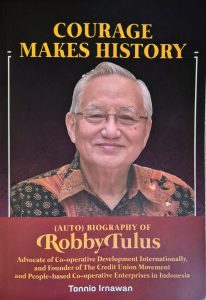Book review: (Auto) Biography of Robby Tulus, Tonnio Irnawan

Written by Tonnio Irnawan, Robby Tulus’ biography depicts his personal and co-operative journey from his early years in Bandung, the capital city of the Indonesian province West Java, to his current life in Ottawa, Canada.
Those who have met Robby know that he is a passionate co-operator who is equally fond of his country of birth, Indonesia, and the country he currently resides in, Canada. Over his long career in the co-operative sector, he contributed to both Canadian and Indonesian co-op movements.
The book reveals interesting details from his childhood that have shaped his education and career path. Robby grew up in a diverse neighbourhood where he was exposed to different cultures, often having to play the peacemaker role between the different communities. He also got to learn how to dance jive from the Ambonese communities he grew up with.
From an early age he had an inclination towards social and economic sciences. Despite this, his University of Padjadjaran degree took longer to complete due to the large-scale killings and civil unrest taking place in Indonesia between 1965-1967.
Political uncertainty was also the main reason why his first credit union venture failed. Robby was first introduced to the idea of credit unions at a Seminar of Socio Economic Life in Asia. He learnt more about the model in 1966 from a Catholic pastor who would go on to become a role model.
In 1968 Robby attended a social economy workshop organised by the Supreme Council of Catholic Bishops of Indonesia, where he heard about credit unions in the Antagonish movement in Eastern Canada, and the Raiffeisen model.
In 1969 he moved to Jakarta with his wife Flora to work for the Institute of Social Development. He then worked with Cuna International, a former division of the USA’s Credit Union National Association (Cuna), and the Social Commission of the Bishops Conference to establish the Credit Union Counselling Office (Cuco) of Indonesia. The organisation focused on raising awareness about credit unions and helping them grow. He took over as a director general of Cuco in 1971.
Despite securing a PhD scholarship from Konstanz University in Germany, Robby chose to stay in Indonesia and help strengthen the nascent credit union movement.
While in his Cuco role he spent time visiting other countries to learn more about credit unions in other parts of Asia, including the Philippines and the Republic of Korea.
He started his career abroad in 1981 as a training specialist of Asian Confederation of Credit Unions (ACCU) part time and then as a staff of the Co-operative Union of Canada (CUC) [now the Co-operative Development Foundation]. In 1983 he became the Asia region Director of the Cooperative Development Foundation of Canada (CDF) under the auspices of the Cooperative Union of Canada (CUC), based in Ottawa, Canada, before joining the International Co-operative Alliance’s Asia-Pacific (ICA-AP) office in 1993 as a senior policy advisor.
In 1996 he took over as the regional director of ICA-AP, a role in which he advocated for the ICA’s vision at different conferences. While there he was able to secure the Indonesian vice president as a keynote speaker at the ICA-AP Open Forum in 2000.
Since his retirement in 2002, Robby has continued to be involved in the Canadian and Indonesian
co-operative movements and worked as a consultant for different governments.
The book gives a good overview of Robby’s efforts to promote co-ops and credit unions in Indonesia and other countries. Beyond this, it gives readers who do not already know Robby a glimpse into his character: an activist guided by values who is always on time, and, above all, a man who hasn’t forgotten his origins.
Nowadays the Indonesia credit union movement has over three million members with assets of over US$3bn. Robby’s pioneering role has, no doubt, played a key role in helping to achieve this growth.